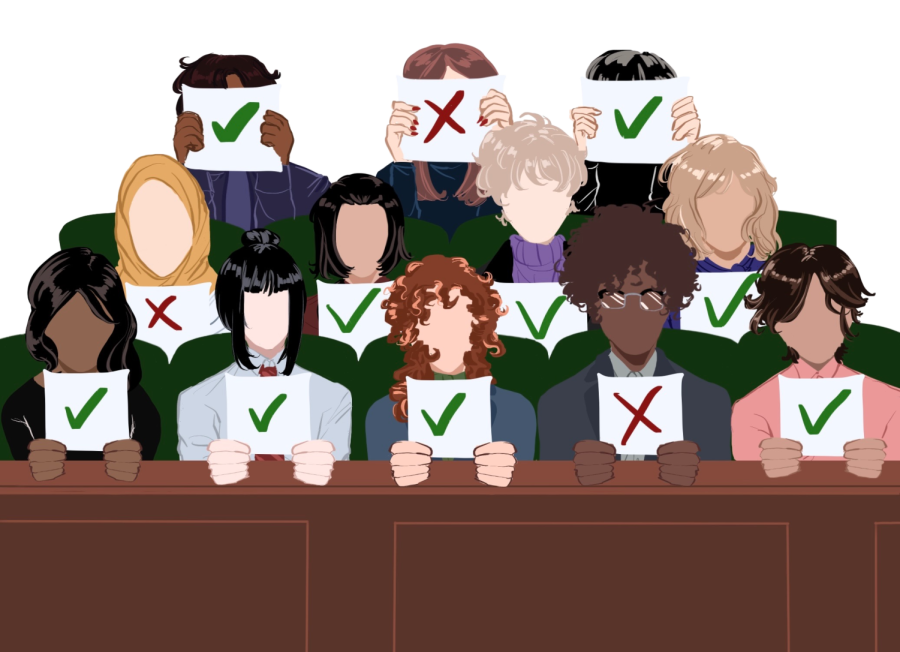The families of the victims in the Parkland shooting held their breath on October 13 as they awaited the punishment for the assailant, Nikolas Cruz. When the judge announced that Cruz would live the rest of his life in a high security prison instead of being sent to death row, many members of the community shared their outrage over the sentencing.
Up until 2016, Florida juries could sentence convicts to death if a majority of the 12 agreed. In Hurst v. Florida, the Supreme Court viewed this law as giving judges too much power and jurors too little. After revisions were made by Florida legislators, the current sentencing law requires all 12 jurors to recommend the death penalty. As the jurors in Cruz’s case only voted 9-3 for capital punishment, this requirement for a unanimous decision led to him being sentenced to life in prison without parole.
Family members of the victims pleaded for the killer to be put on death row as punishment for the lives he had taken. Annika Dworet, the mother of 17-year-old Nicholas Dworet, asked the courtroom, “how much worse would the crime have to be to warrant the death penalty?”
While these families might feel as though capital punishment is what Cruz deserves, writings and drawings released by the Broward County Sheriff’s Office suggest that death is what Cruz wanted. These 30 violent pages ranged from drawings to notes describing that he wanted to go to death row or die of a heart attack. Having been responsible for the deaths of 17, Cruz did not deserve to get what he wanted.
Even beyond Cruz’s case, the death penalty is an unnecessary and violent punishment that should not be endorsed by the state. One reason for this is how the punishment has been inconsistently applied across America due to contrasting perspectives from lawmakers. Just 2% of US counties have imposed 52% of all executions from 1976 to 2015, according to the Death Penalty Information Center. In order to curb implicit unfairness that differing policy perspectives have, serious federal consideration is necessary.
“There is definitely a level of unfairness that comes into that,” said Brandon Burmeister, a government teacher at Trinity. “It would be a good use of federal time to create some kind of threshold that would be a federally mandated kind of threshold in that response.”
Race is also a factor at play. Although only 13.6% of Americans are Black according to the U.S. Census, they make up 34% of those executed. Washington State reported in a 2014 study that in similar cases, jurors are three times more likely to recommend the death penalty for Black defendants compared to their white counterparts. Racism also manifests on the victim’s side of the crime. The chances of getting capital punishment when the defendant is Black is higher than when the defendant is white. During the 1980s in Georgia, the death penalty was given for 70% of black defendants with white victims, as opposed to 15% for white defendants with Black victims.
The death penalty has been defended as long as it does not violate the 8th Amendment and concepts of cruel and unusual punishment. “Botched executions,” or executions that constitute a deviation from proper procedure and typically end in more agony for the prisoner, are a whole other issue. An estimated 3% of all US executions from 1890 to 2010 were botched, regardless of promises that the technology used to perform death sentences was safe and humane, as to not violate the Eighth Amendment. This risky aspect constitutes one of the most inhumane practices our judicial system could ever engage in.
The permanence of the death penalty poses an especially grave threat for those who have been wrongly accused. Since 1973, more than 190 people who were sentenced to death have been proven innocent and exonerated, with the largest number of these exonerations occuring in Florida. Science.org reports that after analyzing more than three decades worth of death sentences across the US, 4.1% are likely to be innocent.
While most people think that the death penalty is still a cheaper option, it’s actually incredibly expensive. The cost of the death penalty isn’t just the lives of those who receive it, but the tangible expenses that come along with it. Trials relating to the death penalty require more experts, lawyers, time in court, appeals and specialty incarceration. Trials involving the death penalty are reported to cost more than eight times what a murder case not seeking the death penalty would cost, according to the Office of Defender Services of the Administrative Office of the U.S. Courts.
With a plethora of ways the death penalty negatively impacts communities, it’s easy to see why the United States is past the need for such a punishment. The sentence is hypocritical at best, using the death sentence for those who kill, and unfair at worst, given arbitrarily and even incorrectly. A civil society should not fall into the trap of the very thing it is trying to eliminate, especially not when it gives some, like Nikolas Cruz, what they view as the easy way out.









